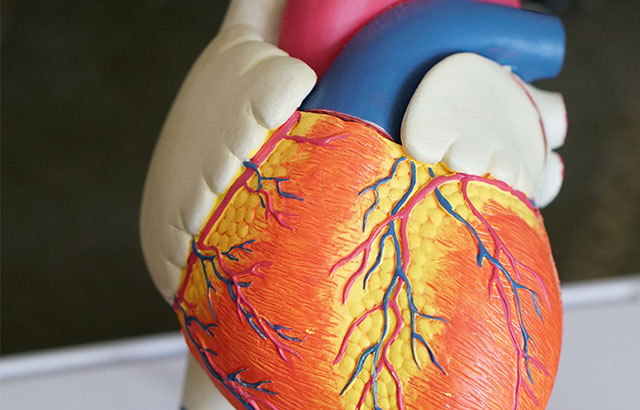BHF invests £34m in top universities, helping to safeguard UK’s world-class research status
The British Heart Foundation (BHF) has this week announced £34million of new funding across 12 universities, in a move that strengthens world-class, UK-led heart and circulatory disease research.

Model of a human heart
The awards come from two highly-competitive BHF funding schemes: the Research Excellence Awards, which were first launched in 2008, and the new Accelerator Awards. The awards provide funding for the next five years and are aimed at empowering researchers to undertake innovative science, break down boundaries and spark new collaborations in heart and circulatory disease research.
Researchers from the William Harvey Research Institute at Queen Mary University of London will receive £1millon over 5 years as part of the Accelerator Awards. Led by BHF Professor Federica Marelli-Berg, investigators will explore the way in which heart inflammation occurs and progresses in order to facilitate the diagnosis and treatment of this disease.
On receiving the award Professor Marelli-Berg said: “The opportunities that this prestigious award offers are immense. We will be able to attract the very best clinical scientists to join our excellent team and, through this, understand, diagnose and treat heart muscle inflammation. We have been inspired by the families who have lost a child because of heart inflammation – extremely healthy young people who quickly succumbed to this disease: we are determined to find a way to prevent these tragedies by developing our scientific knowledge to allow early diagnosis and treatment.”
Inflammation of the cardiac muscle can cause a variety of lethal heart conditions, ranging from sudden cardiac death to more slowly progressive forms of heart failure. This award offers a unique opportunity, together with the prestige that comes with BHF recognition, to tackle this insidious and often undiagnosed disease. World-renowned scientists from Queen Mary University of London will work together with a team of outstanding clinicians running a UK-first dedicated Service for inflammatory heart muscle disease at the Barts Heart Centre.
Sam Mohiddin, Lead of the Barts Clinical Service for Inflammatory Cardiomyopathies said. ‘This award will be used to fight myocarditis, a common form of heart disease that is poorly understood by doctors and the public. Myocarditis occurs when inflammation causes damage to heart muscle, and detecting inflammation deep within the heart can be very difficult to do safely. As a result, many patients remain undiagnosed and researchers have had difficulty developing treatments.
In making this award, the BHF recognizes that our team of clinicians and scientists working together with patients at the Barts Heart Centre have discovered new ways to detect and classify inflammation in the heart. Most importantly, these discoveries could lead to safer and more accurate detection tests and to new types of treatment. The very generous BHF Accelerator Award will fund this research and will improve awareness of myocarditis in order to prevent the suffering and tragedies that this condition causes."
Further information
- Find out about inflammation research at the William Harvey Research Institute.
- Find out about the BHF 4-year MRes/PhD programme at the William Harvey Research Institute.